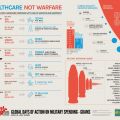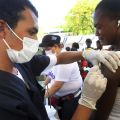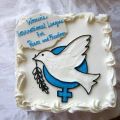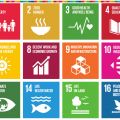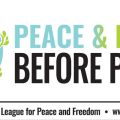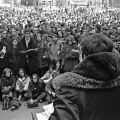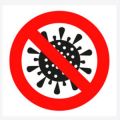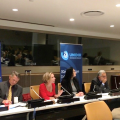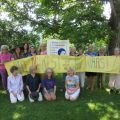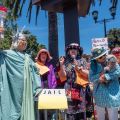The city of Homs in Syria. Credit: Shutterstock.com.
By Odile Hugonot Haber and Regina Birchem
Middle East Committee
June 2020
The war in Syria, ongoing for nine years, leaves the country with a shattered infrastructure, more than 400 medical facilities damaged or completely destroyed, and schools, markets, and homes in rubble. It is estimated that 10.5 million people are in dire need of food, medications, clothing, and are traumatized. This makes them vulnerable to being recruited by one faction or another. To save their own lives they become pawns in what has become a high-level, violent, international conflict.
From 2006 to 2011, Syria and the whole eastern Mediterranean endured high temperatures, long-lasting drought and dust storms. Syria was already a poor country, so the devastated agriculture and food economy led to political unrest. What started on March 15, 2011 with civilian protests against President Bashar Al-Assad’s economic and social policies was met with military attacks by the government Baath Party forces. In July 2011, military defectors created the Free Syrian Army. Assad troops responded violently, imprisoning and killing hundreds.
A month later in August 2011, then-US President Obama called for Assad to step down. Obama was following the path of his US predecessors who in 2002 had placed Syria on their list of “axis of evil” countries, followed recommendations to “destabilize Syria”, and in 2004 imposed sanctions.
In December 2011 the Al-Nusra Front, a new Al-Qaeda affiliate, staged a suicide bombing in Damascus. Thereafter various rebel groups became part of the multi-faceted international conflict with state and non-state actors taking sides in pursuit of their different agendas. The conflict became about more than just regime change.
Here is a brief timeline of important events in Syria from 2012-2019.
Hostilities Continue
As this is being written in late May 2020, hostilities show no sign of abating. Even though Assad’s military has retaken much of the country, there is no peace.
According to the 2020 Report to the 43rd Session of the UN Human Rights Council by the Independent International Commission of Inquiry on the Syrian Arab Republic, violations of international law continue with little protection for civilians. There is no effective peace process. Access to humanitarian aid and independent monitors and journalists is prohibited.
The Syrian Observatory for Human Rights, a British-based organization, documented deaths of 384,000 persons over the nine years as of March 14, 2020. Opposition activist groups estimate the number of deaths are much higher, at least 586,100 people as of March 2020. Due to secrecy and lack of documentation, an estimated additional 105,000 persons have been tortured and killed in prisons and detention centers or in remote areas since 2011.
The Syrian pre-war population was 20.8 million. More than half the population is displaced: 6.1 million internally displaced move about for safety; 1.5 million of these suffer permanent disabilities including 86,000 with loss of limbs. Outside of the country, 6.7 million Syrians make up ⅓ of the world’s refugees with 93% in Turkey, Lebanon, and Jordan.
A Proxy War in Need of a Solution
What started as a civil war has now become a full-blown international conflict.
-
Several New York Times articles have reported that President Obama had secretly authorized the Central Intelligence Agency in 2016 to arm Syria’s rebels in 2013 as partners of Saudi Arabia. (See "U.S. Relies Heavily on Saudi money to Support Syrian Rebels").
-
According to this BBC article, "Why Is There a War in Syria?": In 2018 the US, France, and the United Kingdom carried out a series of military strikes against multiple government infrastructures to support what they considered to be the “Moderate Rebels.” But they have prioritized non-lethal assistance since jihadists became the dominant force in the armed op-position.
-
Russia began bombing raids from on September 30, 2015, that continue to this day in sup-port of pro-regime forces. They also are known to target many hospitals.
-
Israelis acknowledge doing many raids inside Syria and in the Golan heights.
-
According to this October 16, 2019 CNN report, Turkish President Erdogan said a cease-fire was off the table. “Declare a ceasefire, they say. We will never declare a ceasefire," Erdogan said. "We do not sit at the table with terrorist organizations.”
The overall proxy war is for oil and gas, and for international and regional agendas. For the US, it is an international proxy war against Iran and Hezbollah, against multiple factions of Islamic terrorists, and against government forces. It is an extremely volatile and dangerous situation. All actors, including the United States, have violated International Law.
Though rubble is moved about, there has been no real reconstruction by the UN, NATO, or countries responsible for the destruction, nor have countries been held accountable for international law violations.
Most of the six UNESCO World Heritage Sites in Syria representing their ancient culture are destroyed or damaged.
Meanwhile, COVID-19 will continue to kill many people that have survived the war. It is a calamitous situation.
What is the solution? The UN Security Council is at an impasse, paralyzed due to the five nations holding veto power. All militants should leave Syria and all countries must stop providing weapons, profiteering from war and conflict, and harboring and training militants. Once these actions are taken, though it will still be difficult, Syria will be more able to address its future.
Note: On May 14, 2020, the US State Department notified Congress that Syria, Iran, North Korea, Venezuela, and Cuba have been designated as non-cooperative countries in fighting terrorism.
Additional Sources:
https://borgenproject.org/top-10-facts-about-living-conditions-in-syria/
UN Human Rights Council, 43rd Session 2020 (A/HRC/43/57)
www.bbc.co.uk/newsround/16979186
www.sandersinstitute.com/blog/americas-true-role-in-syria
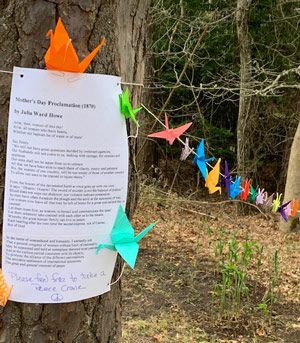 For Mother’s Day, I posted on a tree out front a big copy of Julia Ward Howes’s original Mother’s Day proclamation, along with a line strung with peace cranes. People were invited to take a crane.
For Mother’s Day, I posted on a tree out front a big copy of Julia Ward Howes’s original Mother’s Day proclamation, along with a line strung with peace cranes. People were invited to take a crane.
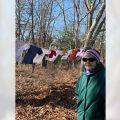

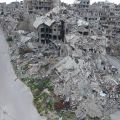
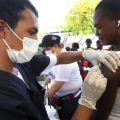
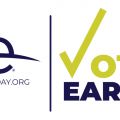
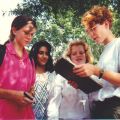
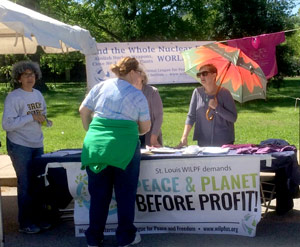 The total number of signatures on the
The total number of signatures on the 